A complete and accurate collection of B1 vocabulary by topic
English vocabulary is divided into 6 levels, corresponding sequentially to A1, A2, B1, B2, C1, C2. Among them, B1 vocabulary has medium difficulty. For English learners at the B1 level, mastering vocabulary will help them have a solid foundation to understand and use in common situations. In this article, PREP will help you compile the B1 vocabulary in a PDF file. Let’s check them out!

I. A collection of B1 vocabulary by topic
PREP has thoroughly collected and compiled the most complete collection of B1 vocabulary. In addition, meanings, types of words, and examples are fully provided so that you can better understand these words!
1. Clothes and Accessories
First of all, let’s dive into B1 English vocabulary related to clothes and accessories, which is a familiar topic to us.
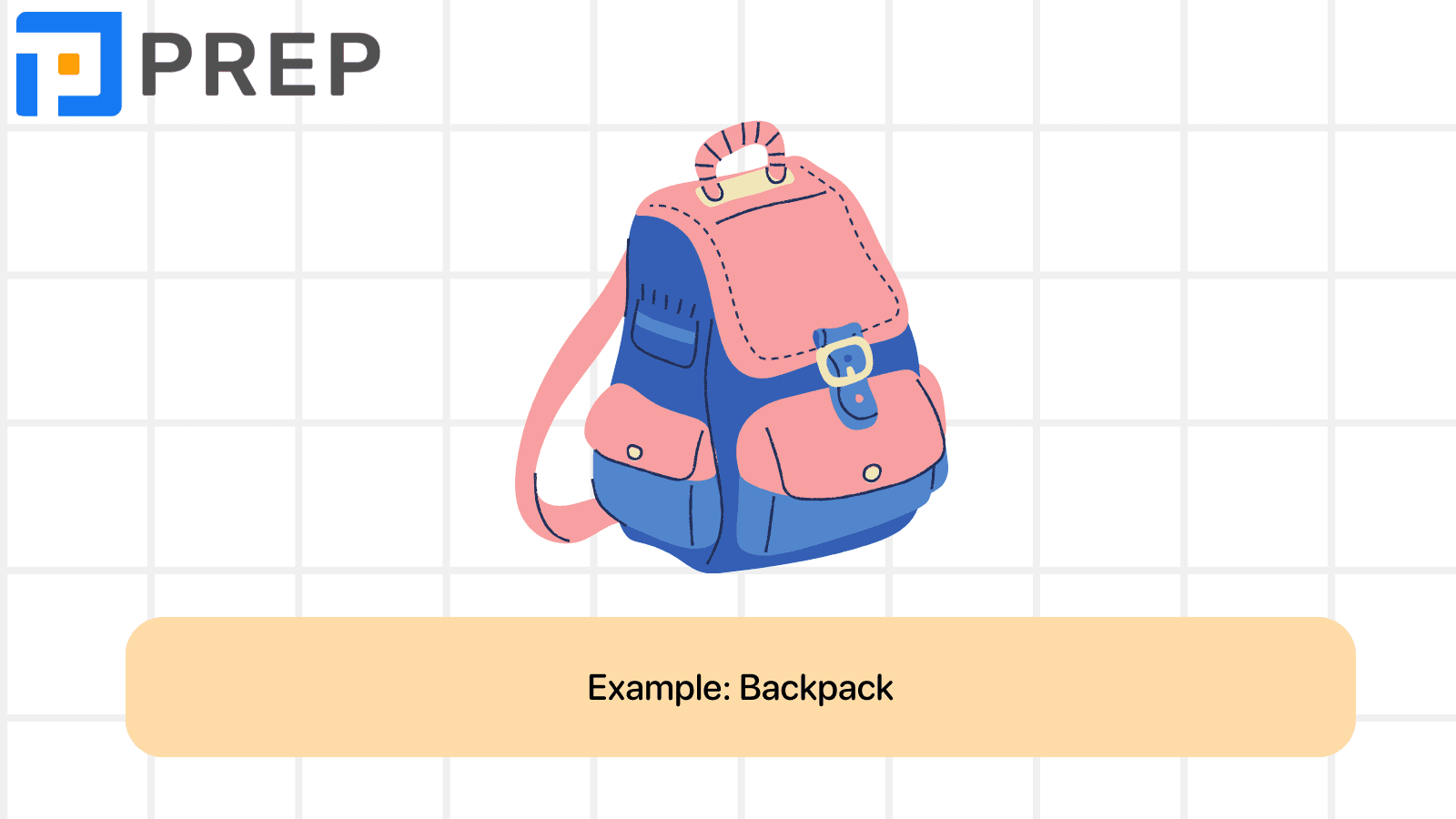
|
B1-level English words: Clothes and Accessories |
|||
|
Backpack (n): a bag that you carry on your back, made of strong material and often used by people who go climbing or walking |
Pullover (v): a knitted piece of clothing made of wool or cotton for the upper part of the body, with long sleeves and no buttons |
Underwear (n): clothes that you wear under other clothes and next to the skin |
Handkerchief (n): a small piece of material or paper that you use for blowing your nose, etc. |
|
Button (n): a small round piece of metal, plastic, etc. that is sewn onto a piece of clothing and used for fastening two parts together |
Silk (n): fine soft thread produced by silkworms |
Underpants (n): a piece of men’s underwear worn under their trousers |
T-shirt (n): an informal shirt, usually with short sleeves (= arms) no collar or buttons, or just a few buttons at the top |
|
Collar (n): the part around the neck of a shirt, jacket or coat that usually folds down |
Sleeve (n): a part of a piece of clothing that covers all or part of your arm |
Jeans (n): trousers made of denim (= a type of strong cotton) |
Sandal (n): a type of light open shoe that is worn in warm weather. The top part consists of leather bands that fasten the sole to your foot. |
|
Cotton (n): a plant grown in warm countries for the soft white hairs around its seeds that are used to make cloth and thread |
Stripe (n): a long narrow line of colour, that is a different colour from the areas next to it |
Kit (n): a set of tools or equipment that you use for a particular purpose |
Sweatshirt (n): a piece of clothing for the upper part of the body, with long sleeves, usually made of thick cotton and often worn for sports |
|
Fasten (v): to close or join together the two parts of something; to become closed or joined together |
Pants (n) : trousers |
Knit (v): to make clothes, etc. from wool, cotton or other thread using two long thin knitting needles or a machine |
Umbrella (n): an object with a round folding frame of long, straight pieces of metal covered with material, that you use to protect yourself from the rain or from hot sun |
|
Fold (n): to bend something, especially paper or cloth, so that one part lies on top of another part |
Tracksuit (n): a warm, loose pair of trousers and matching jacket worn for sports practice or as informal clothes |
Label (n): a piece of paper, etc. that is attached to something and that gives information about it |
Undress (v): to take off your clothes; to remove somebody else’s clothes |
2. Communications and Technology
The next topic is technology. Let’s discover the B1 level vocabulary of this topic with PREP!
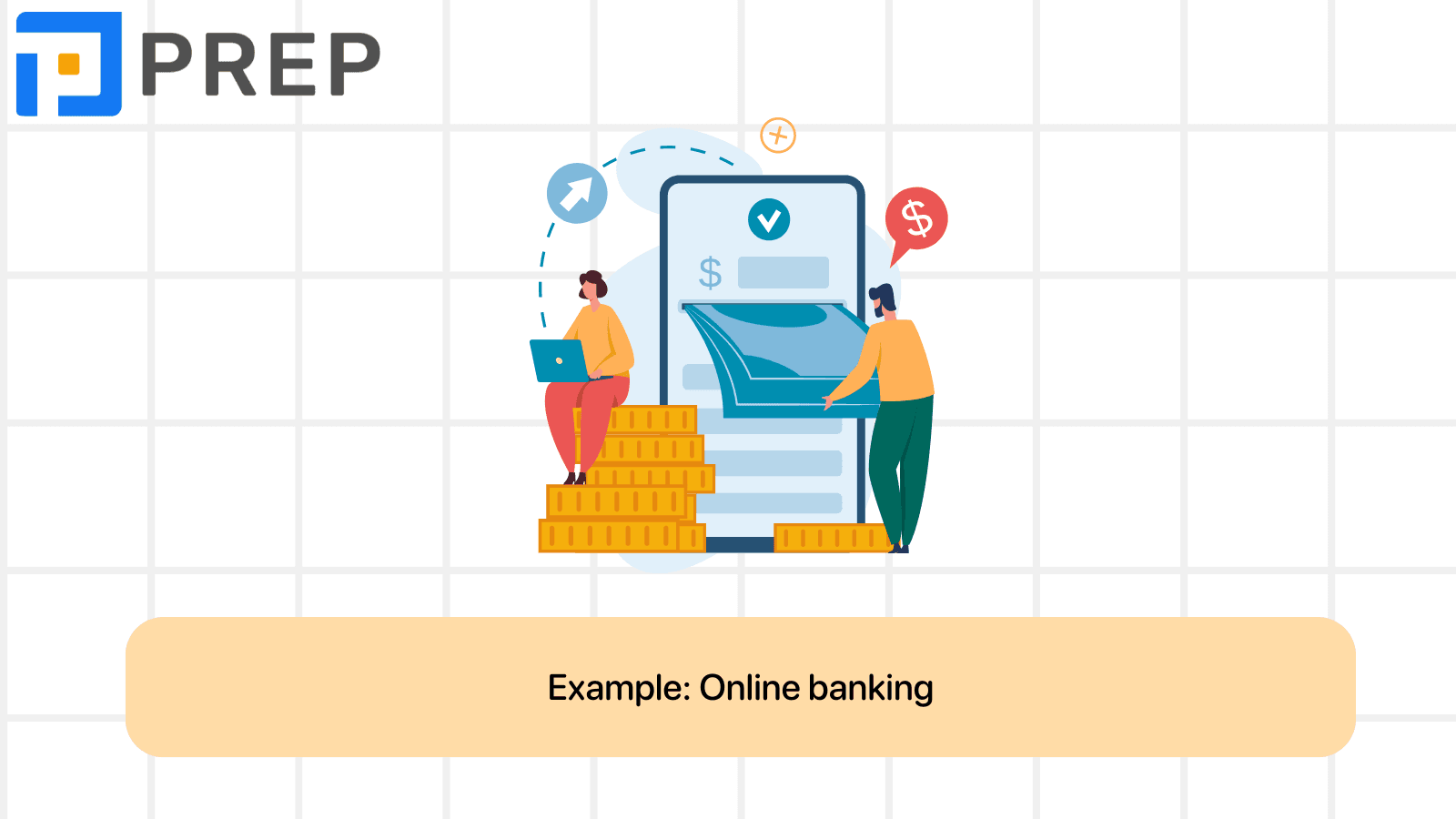
|
B1 vocabulary topic: Communications and Technology |
|||
|
Computer age (n): the era characterized by the widespread use and integration of computers into various aspects of society, including work, communication, and daily life |
Access (v): the opportunity or right to use something or to see somebody/something |
Server (n): a computer program that controls or supplies information to several computers connected in a network; the main computer on which this program is run |
Hardware (n): the machines and electronic parts in a computer or other electronic system |
|
Social media (n): websites and software programs used for social networking |
Blogger (n): a person who writes a blog |
Headline (n): the title of a news article printed in large letters, especially at the top of the front page on a newspaper or the home page on a news website |
Advanced (n): having the most modern and recently developed ideas, methods, etc. |
|
Online banking (n): the digital platform provided by financial institutions that allows customers to conduct various banking transactions and services over the internet |
Blog (n): a website where an individual person, or people representing an organization, write regularly about recent events or topics that interest them, usually with photos and links to other websites that they find interesting |
Homepage (n): the main page created by a company, an organization, etc. on the internet from which connections to other pages can be made |
User-friendly (adj): easy for people who are not experts to use or understand |
|
Technology (n):scientific knowledge used in practical ways in industry, for example in designing new machines |
Calculator (n): a small electronic device or piece of software for calculating with numbers |
Install (v): to fix equipment or furniture into position so that it can be used |
Reliable (adj): that can be trusted to do something well; that you can rely on |
|
Smartphone (n): a mobile phone that also has some of the functions of a computer, for example the facility to use apps and the internet |
Call (v): to give somebody/something a particular name; to use a particular name or title when you are talking to somebody |
Invent (v): to produce or design something that has not existed before |
Affordable (adj): cheap enough that people can afford to pay it or buy it |
|
Tablet (n): a small computer that is easy to carry, with a large touch screen and usually without a physical keyboard |
Delete (v): to remove something that has been written or printed, or that has been stored on a computer |
Parcel (n): something that is wrapped in paper or put into a thick envelope so that it can be sent by mail, carried easily or given as a present |
Sustainable (adj):involving the use of natural products and energy in a way that does not harm the environment |
|
Application (n): a formal (often written) request for something, such as a job, permission to do something or a place at a college or university |
Dial (v): the round part on some older phones, with holes for the fingers, that you move around to call a particular number |
Password (n): a series of letters, numbers, etc. that you must type into a computer or computer system in order to be able to use it |
Powerful (adj): being able to control and influence people and events |
|
Equipment (n): the things that are needed for a particular purpose or activity |
Engaged (v): having agreed to marry somebody |
Reply (v): to say or write something as an answer to somebody/something |
Compact (adj): smaller than is usual for things of the same kind |
|
Connect: to join together two or more things; to be joined together |
Creative (adj): involving the use of skill and the imagination to produce something new or a work of art |
Line (n): a long, thin mark on a surface |
Direct (adj): going in the straightest line between two places without stopping or changing direction |
3. Education
Education is a very common topic that is certainly impossible to be absent from the B1 vocabulary list. Let's explore with PREP to see which vocabulary words in the topic of Education are listed below!
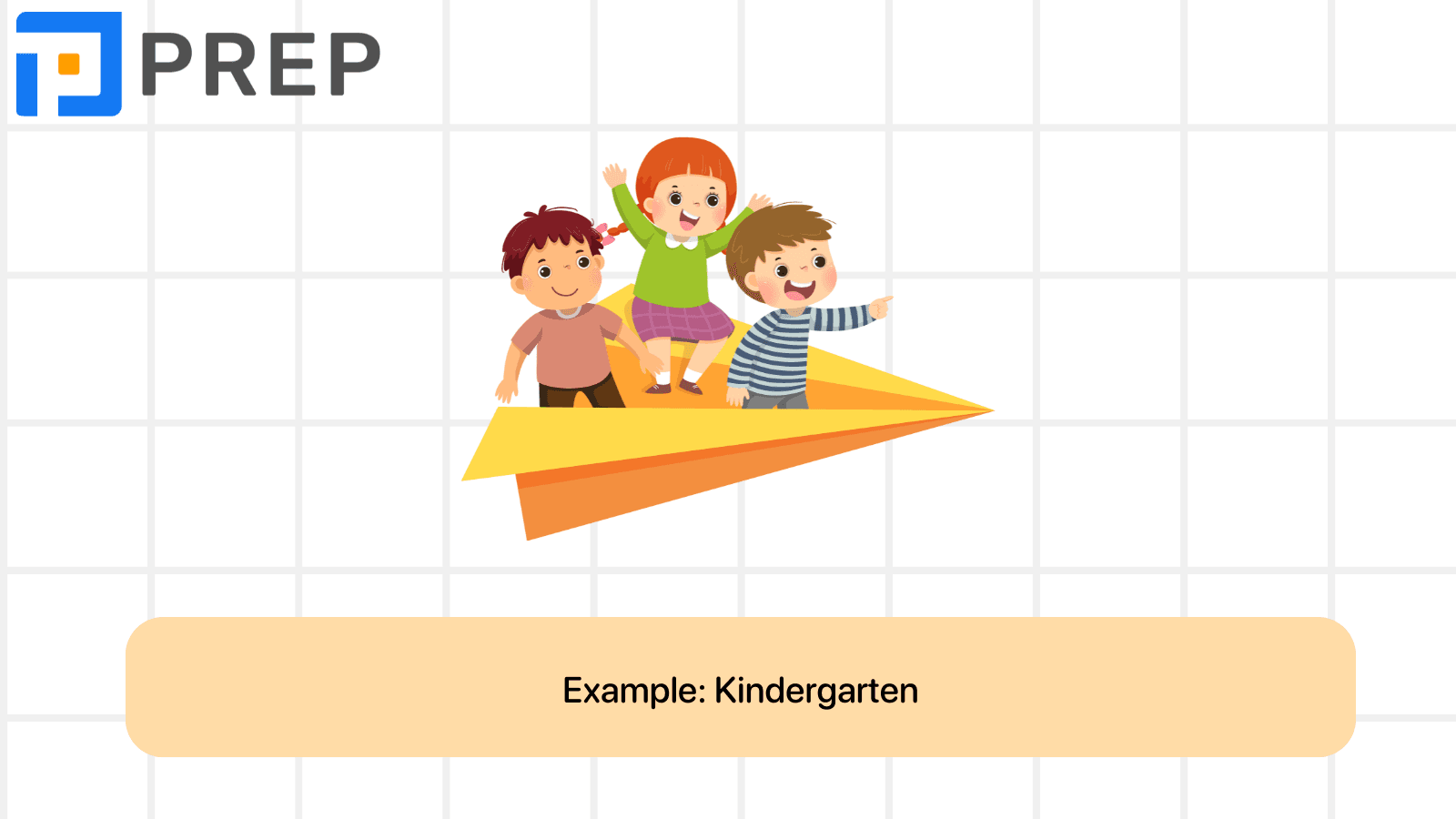
|
B1 level words: Education |
|||
|
Kindergarten (n) : a school or class to prepare children aged five for school |
Intermediate (adj): located between two places, things, states, etc. |
absent (adj): not in a place because of illness, etc. |
Review (v): a report in a newspaper or magazine, or on the internet, television or radio, in which somebody gives their opinion of a book, play, film, product, etc.; the act of writing this kind of report |
|
primary school (n): a school for children between the ages of 4 or 5 and 11 |
Advanced (n): having the most modern and recently developed ideas, methods, etc. |
Qualification (n): an exam that you have passed or a course of study that you have successfully completed |
Memorise (v): to learn something carefully so that you can remember it exactly |
|
junior high school (n): a school for young people between the ages of 12 and 14 |
Bell (n): a hollow metal object, often like a cup in shape, that makes a ringing sound when hit by a small piece of metal inside it; the sound that it makes |
Laboratory (n): a room or building used for scientific research, experiments, testing, etc. |
Explore (v): to travel to or around an area or a country in order to learn about it |
|
University (n): an institution at the highest level of education where you can study for a degree or do research |
Coach (n): a person who trains a person or team in sport |
Register (v): to record your/somebody’s/something’s name on an official list |
Develop (v): to gradually grow or become bigger, more advanced, stronger, etc.; to make something do this |
|
College (n) : a place where students go to study or to receive training after they have left school |
Certificate (n) : an official document that may be used to prove that the facts it states are true |
Research (v): a careful study of a subject, especially in order to discover new facts or information about it |
Encourage (v) : to give somebody support, courage or hope |
|
Secondary school (n): a school for young people between the ages of 11 and 16 or 18 |
Composition (n): the different parts that something is made of; how the different parts are organized |
Subject (n): a thing or person that is being discussed, described or dealt with |
Join (v): to fix or connect two or more things together |
|
Education (n): a process of teaching, training and learning, especially in schools, colleges or universities, to improve knowledge and develop skills |
Curriculum (n): the subjects that are included in a course of study or taught in a school, college, etc. |
Economics (n): the study of how a society organizes its money, trade and industry |
Handwriting (n): writing that is done with a pen or pencil, not printed or typed |
|
Knowledge (n): the information, understanding and skills that you gain through education or experience |
Diploma (n): a document given by a college or university to show that you have passed a particular exam or finished your studies |
Literature (n): written artistic works, especially those with a high and lasting artistic value |
Homework (n): work that teachers give their students to do at home |
|
Skill (n): an ability to do an activity or job well, especially because you have practised it |
Drama (n): a type of film or TV programme that tells an exciting and generally serious story, as opposed to one that is mainly intended to be funny or entertaining |
Test (n): a way of discovering, by questions or practical activities, what someone knows, or what someone or something can do or is like |
Information (n): facts about a situation, person, event, etc. |
|
Lecture (n): a formal talk on a serious subject given to a group of people, especially students |
Midterm (n): in the middle of the period when a government is in office |
Attend (v): to go to an event, place, etc. |
Instructions (n): advice and information about how to do or use something, often written in a book or on the side of a container |
|
Essay (n): a short piece of writing on a particular subject, especially one done by students as part of the work for a course |
Technology (n): (the study and knowledge of) the practical, especially industrial, use of scientific discoveries |
History (n): past events considered together, especially events of a particular period, country, or subject |
Examiner (n): someone whose job is to decide how well someone has done in an examination |
4. Entertainment and Media
Coming up is Social Media - an indispensable topic today. Let's delve into it with PREP and discover the range of vocabulary for B1 associated with this subject, shall we?
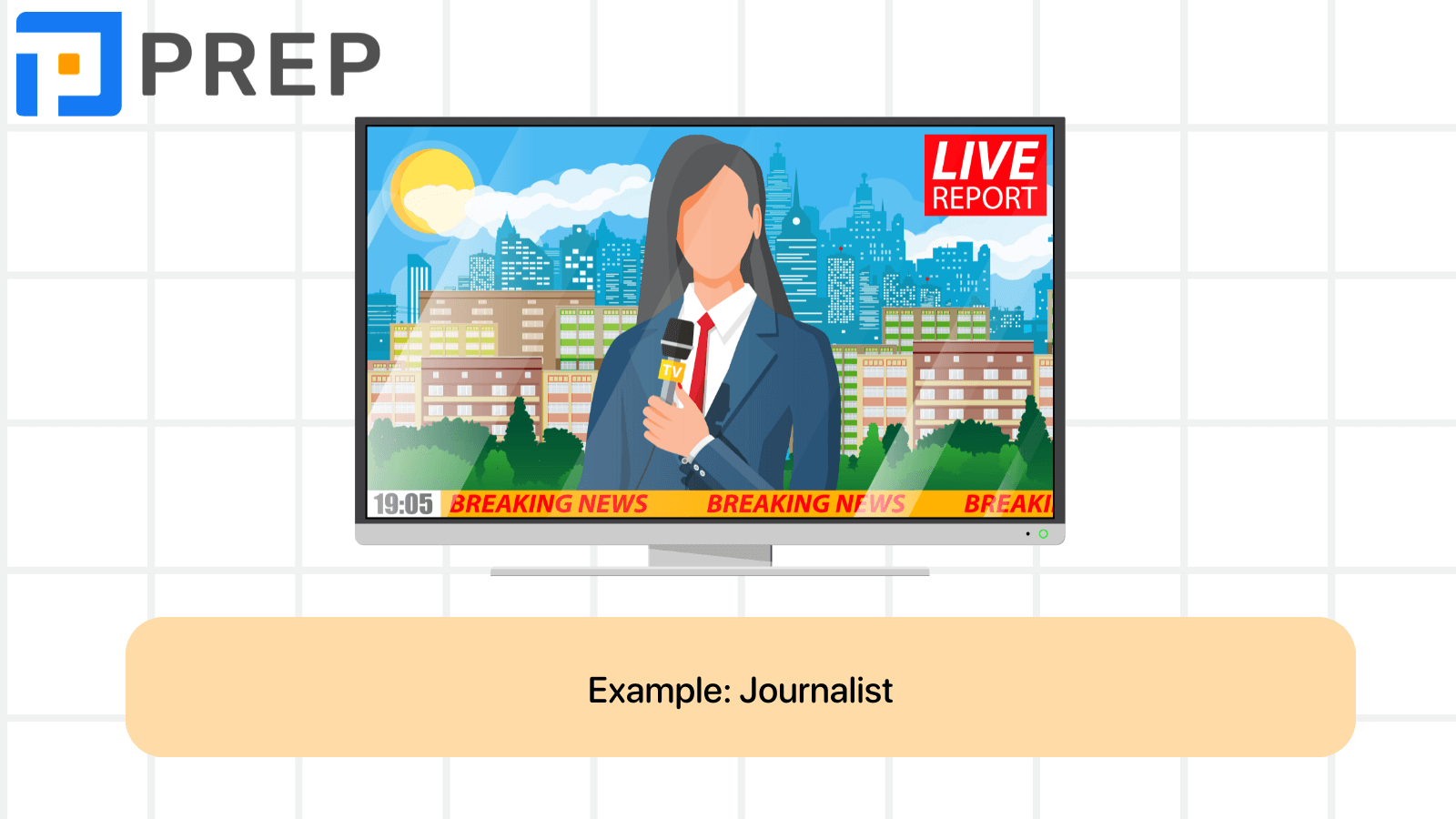
|
B1 vocabulary: Entertainment and Media |
|||
|
Social media (n): websites and software programs used for social networking |
Act (v): to do something for a particular purpose or in order to deal with a situation |
Interval (n): a period of time between two events |
Timely (adv): happening at exactly the right time |
|
Advertising (n): the activity and industry of advertising things to people on television, in newspapers, on the Internet, etc. |
Admission (n): the act of accepting somebody into an institution, organization, etc.; the right to enter a place or to join an institution or organization |
Interviewer (n): the person who asks the questions in an interview |
Wide-reaching (adj): widespread |
|
Digital marketing (n): When businesses leverage internet technologies to deliver promotional advertisements to consumers |
Advert (n): a notice, picture or film telling people about a product, job or service |
Journalist (n): a person whose job is to collect and write news stories for newspapers, magazines, radio, television or online news sites |
Inform (v): to tell somebody about something, especially in an official way |
|
Campaign (n): a series of planned activities that are intended to achieve a particular social, commercial or political aim |
Article (n): a piece of writing about a particular subject in a newspaper or magazine, on a website, etc. |
Orchestra (n): a large group of people who play various musical instruments together, led by a conductor |
Publish (v): to produce a book, magazine, CD-ROM, etc. and sell it to the public |
|
Coverage (n): the reporting of news and sport in the media |
Audience (n): the group of people who have gathered to watch or listen to something (a play, concert, somebody speaking, etc.) |
Record (v): a written account of something that is kept so that it can be looked at and used in the future |
Report (v): a written or spoken account of an event, especially one that is published or broadcast |
|
E-commerce (n): business that is conducted on the internet |
Ballet (n): a style of dancing that tells a dramatic story with music but no talking or singing |
Analyze (v): to examine the nature or structure of something, especially by separating it into its parts, in order to understand or explain it |
Explore (v): to travel to or around an area or a country in order to learn about it |
|
Podcast (n): a digital audio file that can be taken from the internet and played on a computer or a device that you can carry with you |
Circus (n):a group of people, sometimes with trained animals, who perform acts with skill in a show that travels around to different places |
Subscribe (v): to pay an amount of money regularly in order to receive or use something |
Trend (n):a general direction in which a situation is changing or developing |
|
Article (n): a piece of writing about a particular subject in a newspaper or magazine, on a website, etc. |
Comedy (n): a play, film or TV show that is intended to be funny, usually with a happy ending; plays, films and TV shows of this type |
Create (v): to make something happen or exist |
Viewer (n): a person watching television or a video on the internet |
|
Press (v): newspapers and magazines |
Display (v): to put something in a place where people can see it easily; to show something to people |
Comment (v): to express an opinion about something |
Audience (n): the group of people who have gathered to watch or listen to something (a play, concert, somebody speaking, etc.) |
|
Newsfeed (n):a service that provides regular news to be broadcast or distributed on the internet |
Documentary (n): a film or a radio or television programme giving facts about something |
Engross (adj): if something engrosses you, it is so interesting that you give it all your attention and time |
Content (n): the things that are contained in something |
|
Festival (n): a series of performances of music, plays, films, etc., usually organized in the same place once a year; a series of public events connected with a particular activity or idea |
Exhibition (n): a collection of things, for example works of art, that are shown to the public |
Headphones (n): a piece of equipment consisting of two earphones joined by a band across the head that makes it possible to listen to music, the radio, etc. without other people hearing it |
Guitarist (n): a person who plays the guitar |
5. Environment
Let’s check out which environment-related words fall into the B1 category!
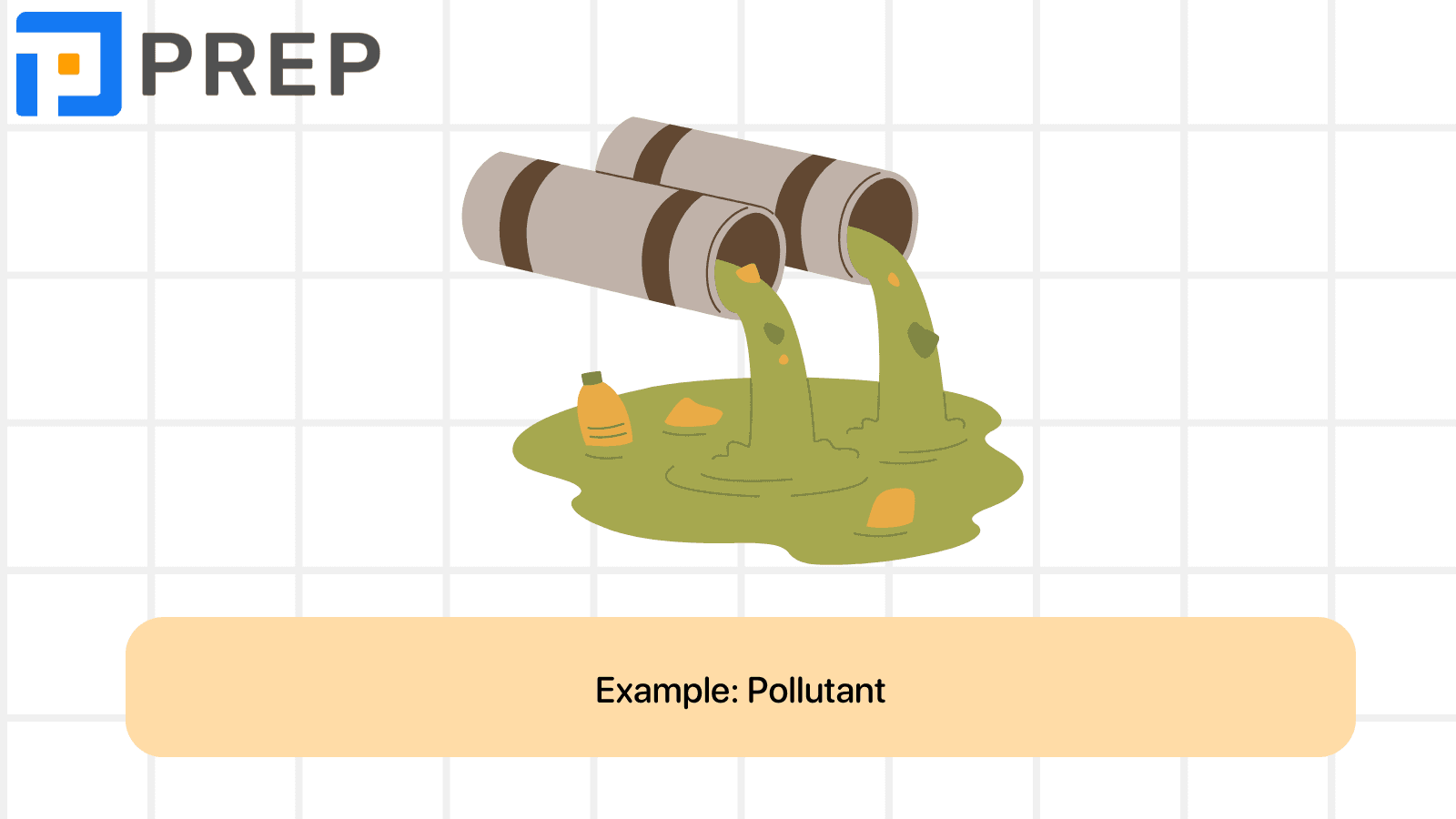
|
B1 vocabulary: Environment |
|||
|
Pollution (n): the process of making air, water, soil, etc. dirty; the state of being dirty |
Save (v): to keep somebody/something safe from death, harm, loss, etc. |
Recycling (v):the process of treating things that have already been used so that they can be used again |
Pollutant (n): a substance that pollutes something, especially air and water |
|
Danger (n): the possibility of something happening that will injure, harm or kill somebody, or damage or destroy something |
Change (v): to become different |
Biodiversity (n): the existence of a large number of different kinds of animals and plants which make a balanced environment |
Environment (n): the natural world in which people, animals and plants live |
|
Planet (n): a large round object in space that moves around a star (such as the sun) and receives light from it |
Conserve (v): to protect something and prevent it from being changed or destroyed |
Deforestation (n): the act of cutting down or burning the trees in an area |
Climate (n): the regular pattern of weather conditions of a particular place |
|
Greenhouse (n): a building with glass sides and a glass roof for growing plants in |
Protect (v): to make sure that somebody/something is not harmed, injured, damaged, etc. |
Rubbish (n): things that you throw away because you no longer want or need them |
Wildlife (n): animals, birds, insects, etc. that are wild and live in a natural environment |
|
Ecosystem (n): all the plants and living creatures in a particular area considered in relation to their physical environment |
Leaf (n): a flat green part of a plant, growing from a stem or branch or from the root |
Natural resource (n): any of the materials such as water, coal, and wood that exist in nature and can be used by people |
Energy (n): the strength, effort and enthusiasm required for physical or mental activity, work, etc. |
6. Food and Drink
Moving on to the topic of food & drinks, let's explore with PREP to see which words are related to this topic!
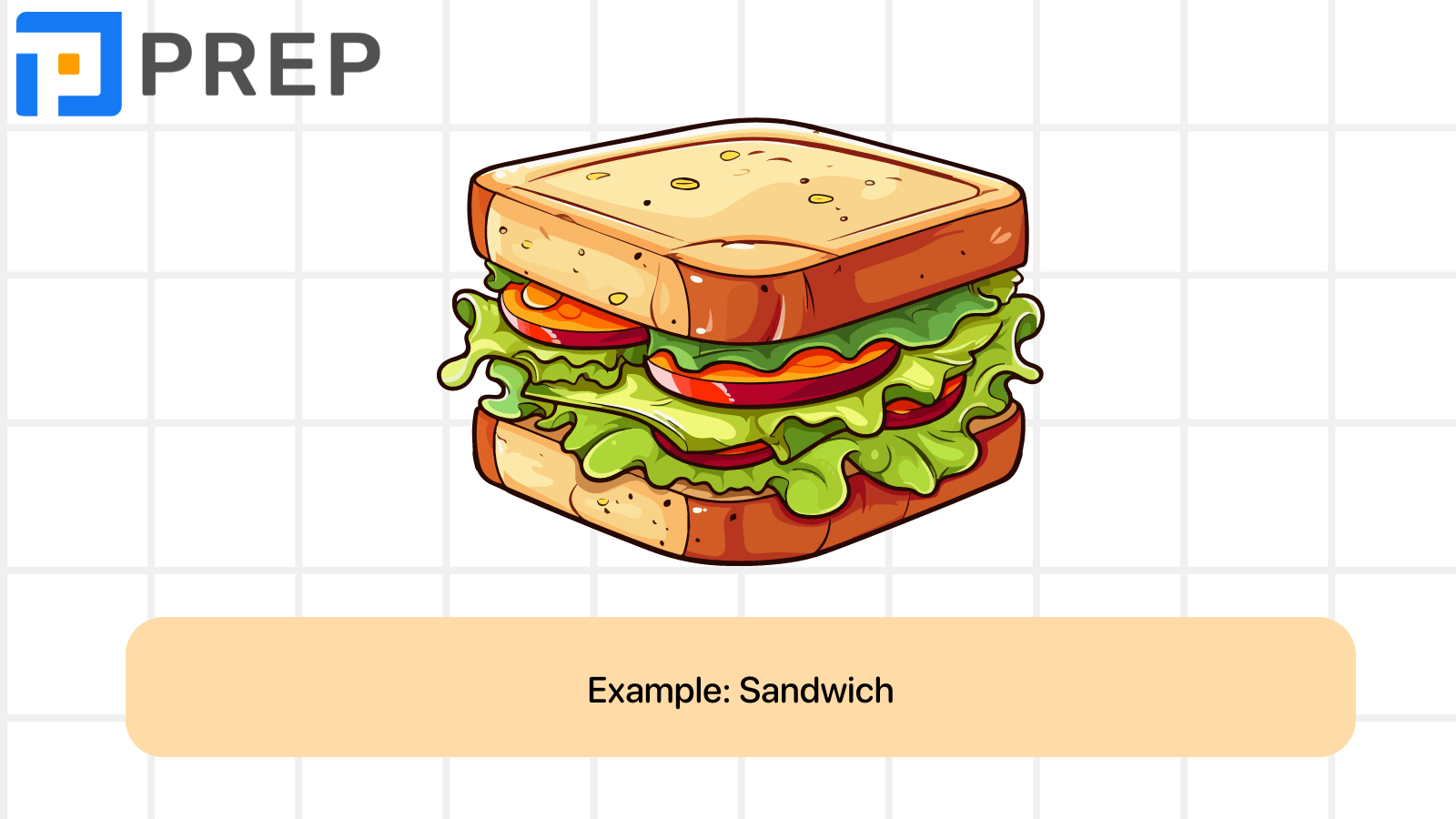
|
B1 vocabulary: Food and Drink |
|||
|
Lettuce (n): a plant with large green leaves that are eaten raw, especially in salad. There are many types of lettuce. |
Herbs (n): a plant whose leaves, flowers or seeds are used to add taste to food, in medicines or for their pleasant smell. parsley, mint and oregano are all herbs. |
Peanut (n): a nut that grows underground in a thin shell |
Vegetarian (n): a person who does not eat meat or fish |
|
Cucumber (n): a long vegetable with dark green skin that is light green inside, usually eaten raw |
Coconut (n): the large nut of a tropical tree called a coconut palm. It grows inside a hard shell and contains a soft white substance that can be eaten and juice that can be drunk. |
Pineapple (n): a large tropical fruit with thick rough skin and stiff leaves on top, that is sweet and yellow inside with a lot of juice |
Sandwich (n): two slices of bread, often spread with butter, with a layer of meat, cheese, etc. between them |
|
Delicious (adj): having a very pleasant taste or smell |
Ingredients (n): one of the things from which something is made, especially one of the foods that are used together to make a particular dish |
Salmon (n): a large fish that has silver skin and is pink inside and is used for food. Salmon live in the sea but swim up rivers to lay their eggs. |
Strawberry (n): enlarge imagea soft red fruit with very small yellow seeds on the surface, that grows on a low plant |
|
Flavour (n): how food or drink tastes |
Jam (n): a thick sweet substance made by boiling fruit with sugar, often sold in jars and spread on bread |
Sausage (n): a mixture of meat, fat, bread, etc. cut into small pieces, put into a long tube of skin, cooked and eaten whole or served cold in thin slices |
Recipe (n): a set of instructions that tells you how to cook something and the ingredients (= items of food) you need for it |
|
Fresh (adj): recently produced or picked and not frozen, dried or preserved in tins or cans |
Jug (n): a container with a handle and a lip, for holding and pouring liquids |
Spinach (n):a vegetable with large, dark-green leaves that are cooked or eaten in salads |
Watermelon (n): a type of large melon, with hard, dark-green skin, that is red inside and has black seeds |
7. Body & Health
The next theme is body & health. Let’s check out which words of this theme fall into the B1 category!
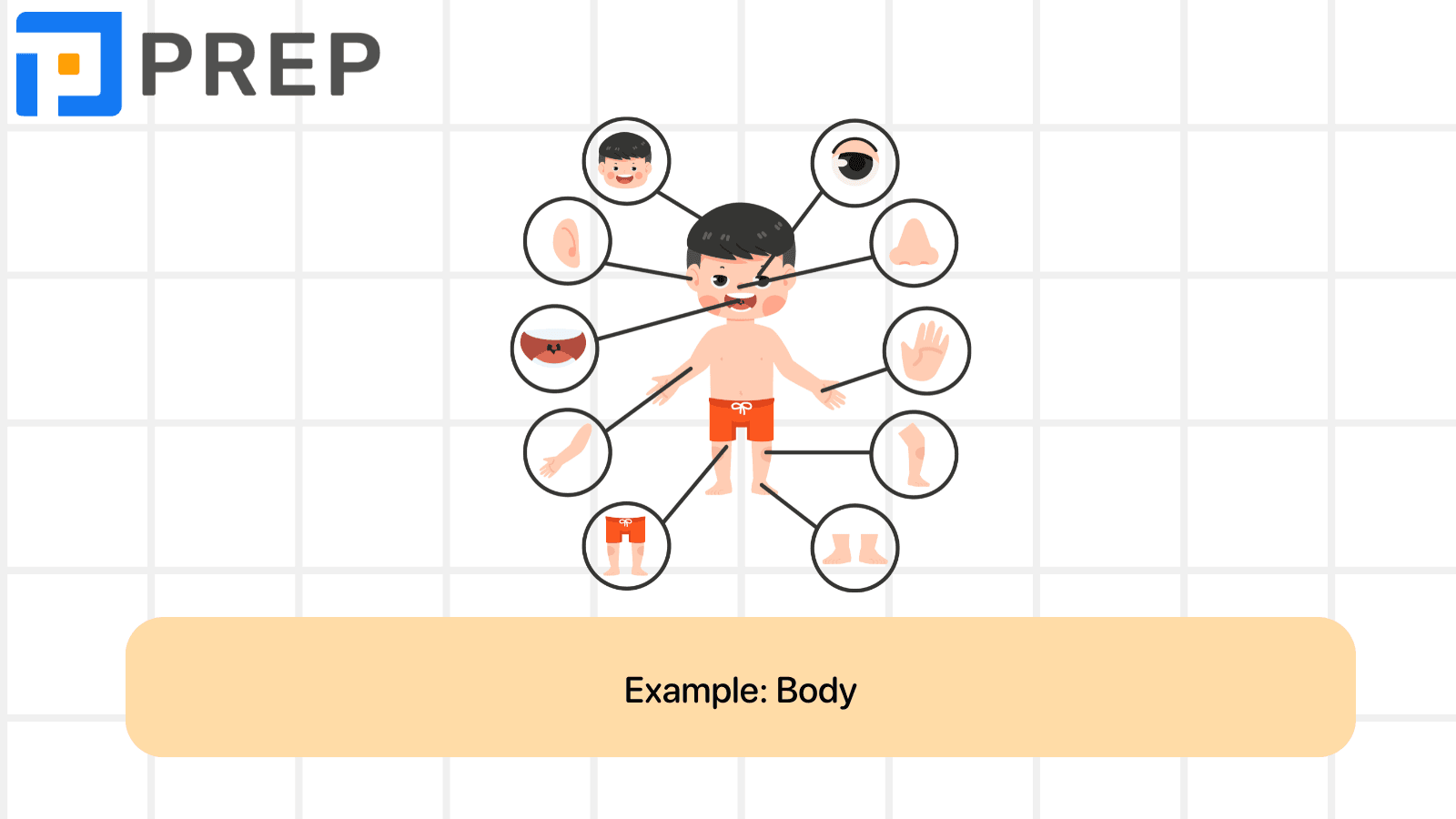
|
B1 vocabulary: Body & Health |
|||
|
Body (n): the whole physical structure of a human or an animal |
Avoid (v): to prevent something bad from happening |
Knee (n): the joint between the top and bottom parts of the leg where it bends in the middle |
Restful (adj):that makes you feel relaxed and peaceful |
|
Chin (n): the part of the face below the mouth and above the neck |
Fitness (n): the state of being physically healthy and strong |
Medicine (n): the study and treatment of diseases and injuries |
Energised (adj): to make somebody enthusiastic about something |
|
Bone (n): any of the hard parts that form the skeleton of the body of a human or an animal |
Breath (v): the air that you take into your lungs and send out again |
Injure (v): to harm yourself or somebody else physically, especially in an accident |
Refreshed (adj): to make somebody feel less tired or less hot |
|
Fitness (n): the state of being physically healthy and strong |
Chemist (n): a person whose job is to prepare and sell medicines, and who works in a shop |
Patient (adj): a person who is receiving medical treatment, especially in a hospital |
Stress-free (adj): not stressful |
|
Ankle (n): the joint connecting the foot to the leg; the narrow part of the leg just above the ankle joint |
Control (v): the power to make decisions about how a country, an area, an organization, etc. is run |
Pharmacy (n): a shop, or part of one, that sells medicines and drugs |
Vigorous (adj): very active, determined or full of energy |
|
Thumb (n): the short, thick finger at the side of the hand, slightly apart from the other four |
Quit (v): to leave your job, school, etc. |
Pill (n): a small flat round piece of medicine that you swallow whole, without biting it |
Holistic (adj): considering a whole thing or being to be more than a collection of parts |
|
Shoulder (n): either of the two parts of the body between the top of each arm and the neck |
Hydrate (v): to make something/somebody take in and hold water |
Prescription (n): an official piece of paper on which a doctor writes the type of medicine you should have, and which enables you to get it from a chemist's |
Calming (Adj): to make somebody/something become quiet and more relaxed, especially after strong emotion or excitement |
|
Skin (n): the layer of tissue that covers the body |
Reduce (v): to make something less or smaller in size, quantity, price, etc.; to become less or smaller in size, quantity, etc. |
Recover (v): to get well again after being ill, hurt, etc. |
Sleep (v): to rest with your eyes closed and your mind and body not active |
|
Knee (n): the joint between the top and bottom parts of the leg where it bends in the middle |
Aspirin (n): a drug used to reduce pain, high temperature and inflammation |
Shoulder (n): either of the two parts of the body between the top of each arm and the neck |
Rest (v): to relax, sleep or do nothing after a period of activity or illness; to not use a part of your body for some time |
|
Wellness (n): the state of being healthy, especially when you actively try to achieve this |
Bleed (n): to lose blood, especially from a wound or an injury |
Skin (n): the layer of tissue that covers the body |
Relax (v): to rest while you are doing something that you enjoy, especially after work or effort |
|
Diet (n): the food and drink that you eat and drink regularly |
Active (adj): always busy doing things, especially physical activities |
Stress (n): pressure or worry caused by problems in somebody’s life or by having too much to do |
Fit (v): to be the right shape and size for somebody/something |
|
Weight (n): how heavy somebody/something is, which can be measured in, for example, kilograms or pounds |
Sleep (v): to rest with your eyes closed and your mind and body not active |
Danger (n): the possibility of something happening that will injure, harm or kill somebody, or damage or destroy something |
Emergency (n): a sudden serious and dangerous event or situation that needs immediate action to deal with it |
|
Body (n): the whole physical structure of a human or an animal |
Meditate (v): to focus your mind, usually in silence, especially for religious reasons or in order to make your mind calm |
Diet (v): the food and drink that you eat and drink regularly |
Fever (n): a medical condition in which a person has a temperature that is higher than normal |
|
Mind (n): the part of a person that makes them able to be aware of things, to think and to feel |
Illness (n): the state of being physically or mentally ill |
Damage (v): to have a bad or harmful effect on something/somebody |
Gymnastics (n): physical exercises, often using special equipment, that develop and show the body’s strength and ability to move and bend easily, often done as a sport in competitions |
8. Hobbies and Leisure
Let’s discover which B1 vocabulary is related to hobbies and leisure!
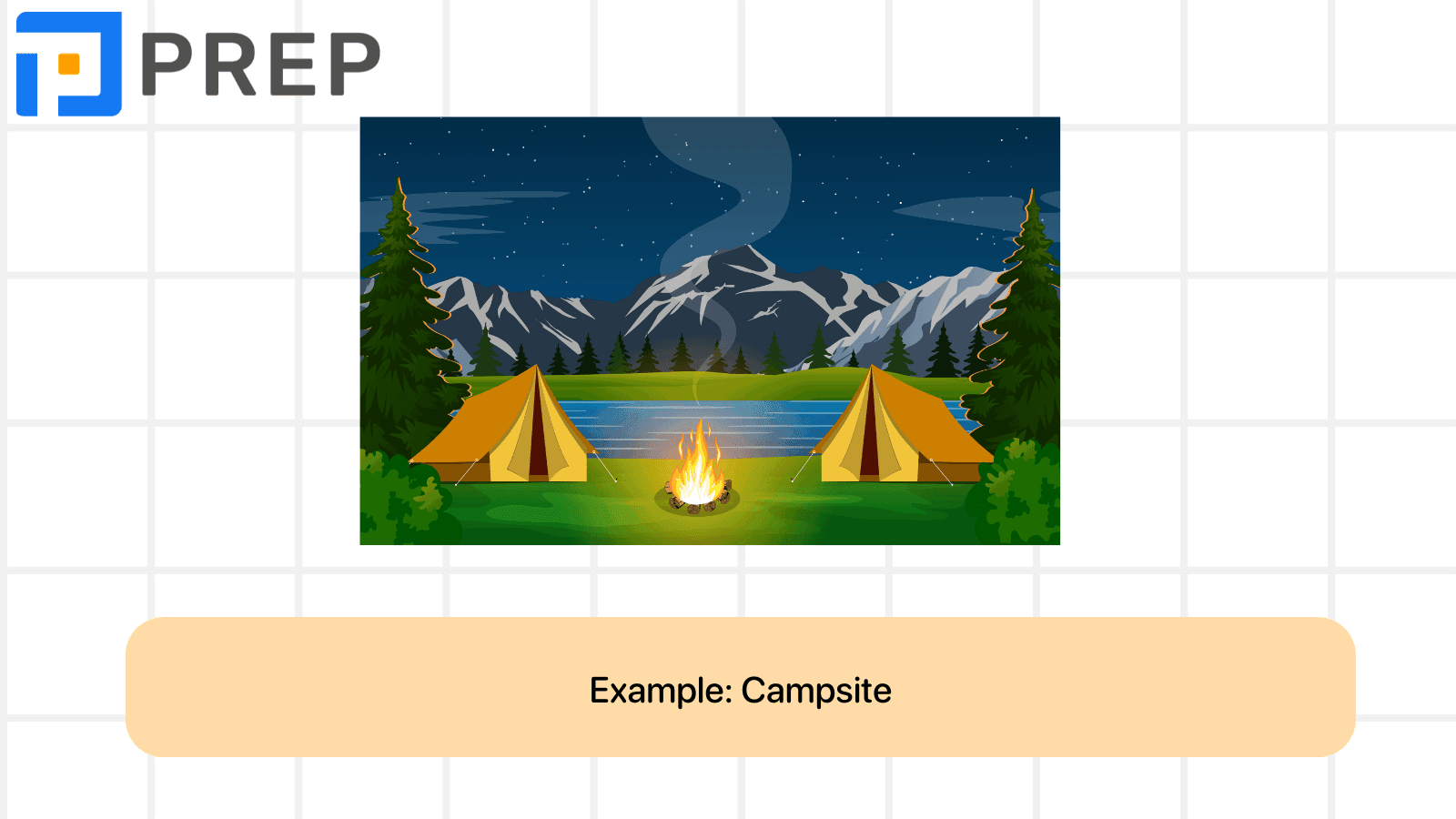
|
B1 vocabulary B1: Hobbies and Leisure |
|||
|
Camp (v): to put up a tent and live in it for a short time |
Nightlife (n): entertainment that is available in the evening and at night |
Facilities (n): buildings, services, equipment, etc. that are provided for a particular purpose |
Holiday (n): a period of time when you are not at work or school |
|
Campsite (n): a place where people on holiday can put up their tents, park their caravan, etc., often with toilets, water, etc. |
Musician (n): a person who plays a musical instrument or writes music, especially as a job |
Fan (n): a machine that creates a current of air |
Jog (v): to run slowly and steadily for a long time, especially for exercise |
|
Club (n): an organization for people who share an interest or do a sport or activity together |
Party (n): a social occasion, often in a person’s home, at which people eat, drink, talk, dance and enjoy themselves |
Festival (n):a series of performances of music, plays, films, etc., usually organized in the same place once a year; a series of public events connected with a particular activity or idea |
Membership (n): the state of being a member of a group, a club, an organization, etc. |
|
Collection (n):a group of objects, often of the same sort, that have been collected |
Quiz (v): a competition or game in which people try to answer questions to test their knowledge |
Fiction (n): a type of literature that describes imaginary people and events, not real ones |
Model (n): a copy of something, usually smaller than the original object |
|
Computer (n): an electronic machine that can store, organize and find information, do processes with numbers and other data, and control other machines |
Sculpture (n): a work of art that is a solid figure or object made by carving or shaping wood, stone, clay, metal, etc. |
Gallery (n): a room or building for showing works of art, especially to the public |
Tent (n): a shelter made of a large sheet of canvas, nylon, etc. that is supported by poles and ropes fixed to the ground, and is used especially for camping |
|
Cruise (n): a journey by sea, visiting different places, especially as a holiday |
Sunbathe (v): to sit or lie in the sun, especially in order to go brown (get a suntan) |
Hire (v): to give somebody a job |
Dance (v): to move your body to the sound and rhythm of music |
9. House and Hometown
The next topic is hometown. Let’s check which B1 vocabulary falls into this topic with PREP!
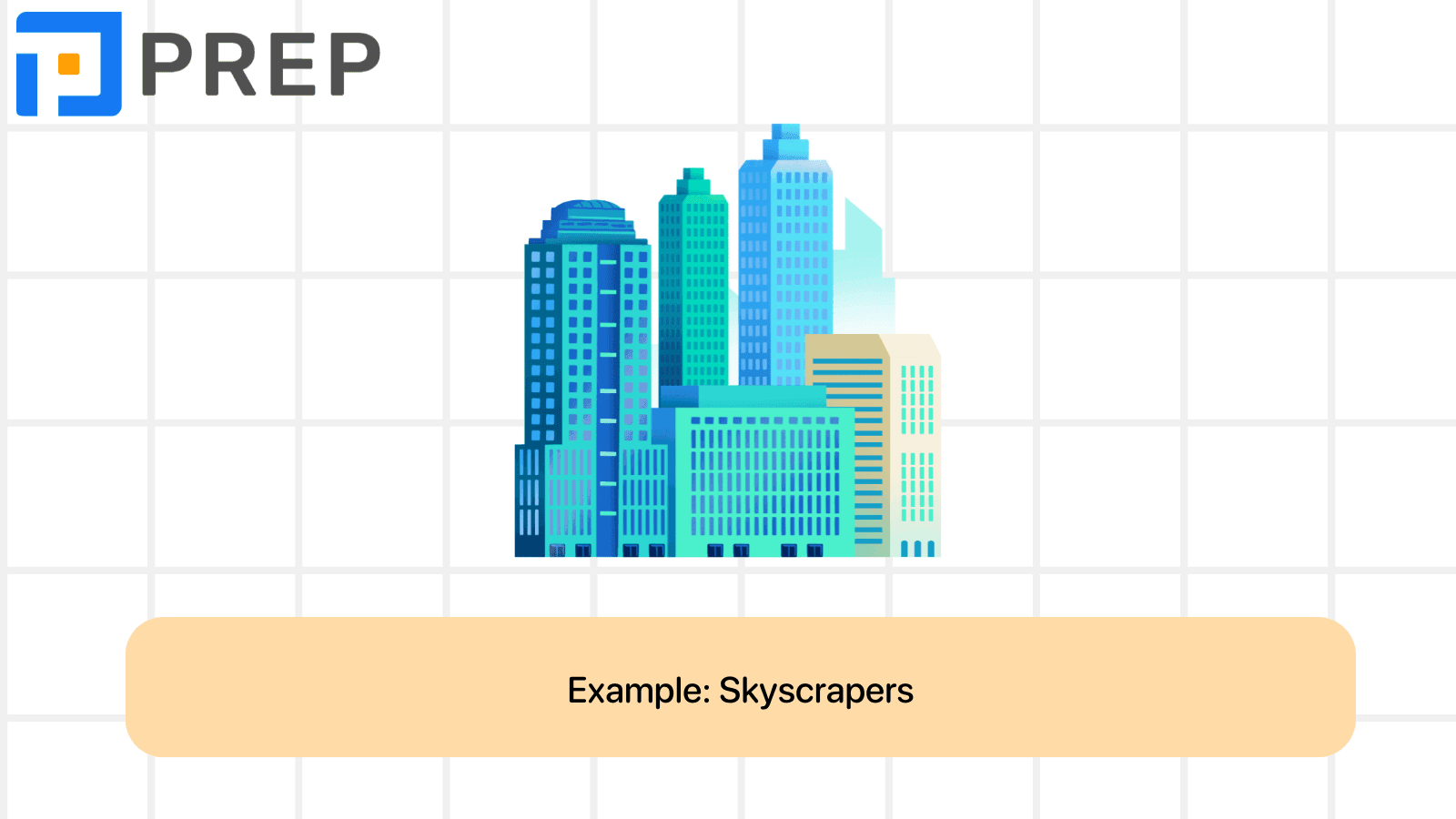
|
B1 vocabulary: House and Home |
|||
|
Coastal city (n): the city that is located near the sea |
Close-knit (Adj): having strong relationships with each other and taking a close, friendly interest in each other’s activities and problems |
Candle (n): a round stick of wax with a piece of string (called a wick) through the middle that is lit to give light as it burns |
Oven (n): the part of a cooker that is like a box with a door on the front, in which food is cooked or heated |
|
Skyscrapers (n): a very tall building in a city |
Cultural (adj): connected with the culture of a particular society or group, its customs, beliefs, etc. |
Central (adj): in the centre of an area or object |
Pipe (n): a tube through which liquids and gases can flow |
|
Landscape (n): everything you can see when you look across a large area of land, especially in the country |
Traditional (adj): being part of the beliefs, customs or way of life of a particular group of people, that have not changed for a long time |
Cottage (n): a small house, especially in the country |
Remote control (n): a device that allows you to operate a television, etc. from a distance |
|
Neighbourhood (n : a district or an area of a town; the people who live there |
Explore (v): to travel to or around an area or a country in order to learn about it |
Cushion (n): a cloth bag filled with soft material or feathers that is used, for example, to make a seat more comfortable |
Repair (v): to fix something that is broken, damaged or torn |
|
Culture (n : the customs and beliefs, art, way of life and social organization of a particular country or group |
Miss (n): used before the family name, or the first and family names, of a woman who is not married, in order to speak or write to her politely |
Dishwasher (n): a machine for washing plates, cups, etc. |
Sink (n): a large open container in a kitchen that has taps to supply water and that you use for washing dishes in |
|
Historic (Adj): important in history; likely to be thought of as important at some time in the future |
Discover (v): to be the first person to become aware that a particular place or thing exists |
Dustbin (n): a large container with a lid (= cover), used for putting rubbish in, usually kept outside the house |
Table (n): a piece of furniture that consists of a flat top supported by legs |
|
Vibrant (adj): full of life and energy |
Cherish (adj): to love somebody/something very much and want to protect them or it |
Entrance (n): a door, gate, passage, etc. used for entering a room, building or place |
Vase (n): a container made of glass, etc., used for holding cut flowers or as an attractive object |
|
Welcoming (adj): friendly towards somebody who is visiting or arriving |
Neighbour (n): a person who lives next to you or near you |
Flat (n): a set of rooms for living in, usually on one floor of a building |
Alarm (n): a loud noise or a signal that warns people of danger or of a problem |
|
Cozy (adj): warm, comfortable and safe, especially in a small space |
Locate (v): to find the exact position of somebody/something |
Floor (n): the surface of a room that you walk on |
Antique (n): old and often valuable |
|
Lively (adj): full of life and energy; active and enthusiastic |
Accommodation (n): a place to live, work or stay in |
Garage (n): a building for keeping one or more cars or other vehicles in |
Balcony (n):a platform that is built on the upstairs outside wall of a building, with a wall or rail around it. You can get out onto a balcony from an upstairs room. |
|
Bell (n): a hollow metal object, often like a cup in shape, that makes a ringing sound when hit by a small piece of metal inside it; the sound that it makes |
air conditioning (n): a system that cools and dries the air in a building or car |
Gate (n): a barrier like a door that is used to close an opening in a fence or a wall outside a building |
Basin (n):a large bowl that has taps and is fixed to the wall in a bathroom, used for washing your hands and face in |
|
Bin (n): a container that you put waste in |
Blind (adj): not able to see |
Grill (n): the part of a cooker that directs heat downwards to cook food that is placed under it |
Kettle (n): a container with a lid, a handle and a spout, used for boiling water |
|
Jug (n): a container with a handle and a lip, for holding and pouring liquids |
Block (n): a large piece of a solid material that is square or rectangular in shape and usually has flat sides |
Heat (n): the quality of being hot |
Ladder (n): a piece of equipment for climbing up and down a wall, the side of a building, etc., consisting of two lengths of wood or metal that are joined together by steps or rungs |
|
Iron (n): a chemical element. Iron is a hard strong metal that is used to make steel and is also found in small quantities in blood and food. |
Bucket (n): an open container with a handle, used for carrying or holding liquids, sand, etc. |
Housework (n): the work involved in taking care of a home and family, for example cleaning and cooking |
Lift (n): a machine that carries people or goods up and down to different levels in a building or a mine |
10. Language
The next theme is languages. Let’s accompany PREP to discover which language-related words are in the B1 level!
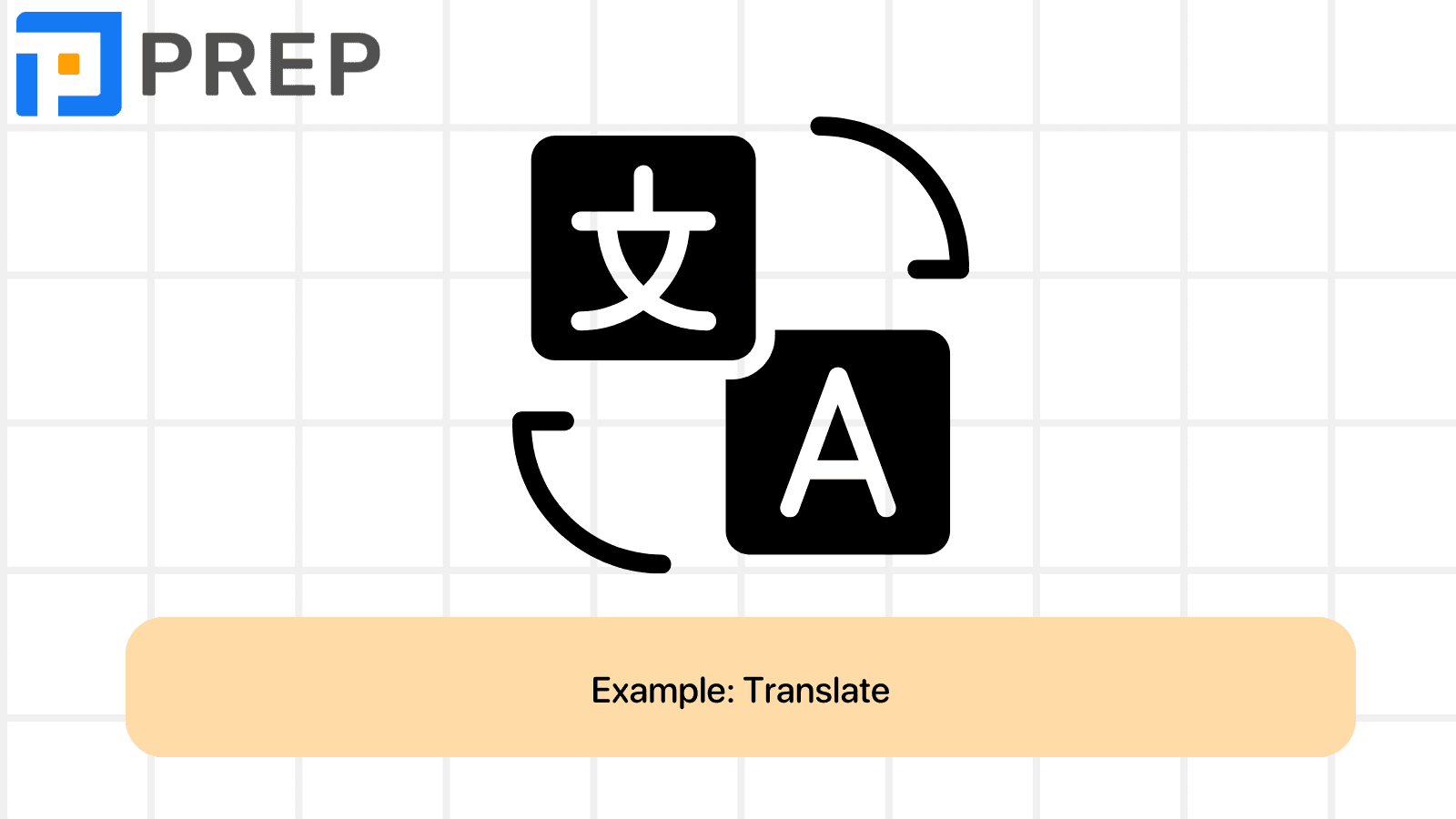
|
B1 vocabulary: Language |
|||
|
Answer (v): to say, write or do something as a reaction to a question or situation |
Joke (n): something that you say or do to make people laugh, for example a funny story that you tell |
Pronounce (v): to make the sound of a word or letter in a particular way |
Translate (v): to express the meaning of speech or writing in a different language |
|
Argue (v): to speak angrily to somebody because you disagree with them |
Mean (v): to have something as a meaning in the same or another language |
Say (v): to speak or tell somebody something, using words |
Alphabet (n): a set of letters or symbols in a fixed order used for writing a language |
|
Ask (v): to say or write something in the form of a question, in order to get information |
Mention (v): to write or speak about something/somebody, especially without giving much information |
Shout (v): to say something in a loud voice; to speak loudly/angrily to somebody |
National (adj): connected with a particular nation; shared by a whole nation |
11. Personal Feelings, Opinions
How would we express human emotions, viewpoints, and character traits? Let's explore some B1-level words related to this topic together with PREP!
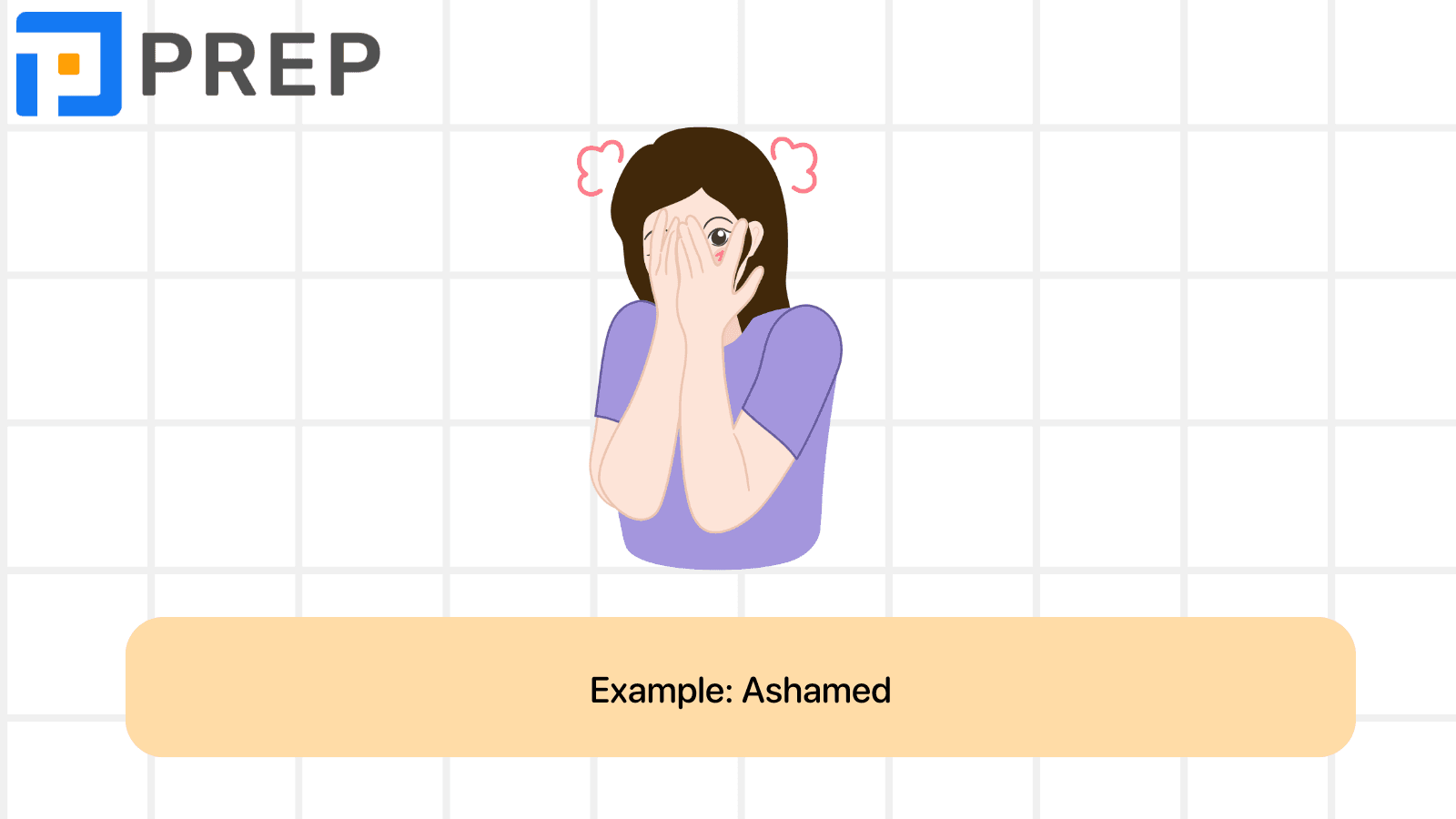
|
B1 vocabulary: Personal Feelings, Opinions |
|||
|
Amazed (adj): very surprised |
Charming (adj): very pleasant or attractive |
Depressed (adj): very sad and without hope |
Generous (adj): giving or willing to give freely; given freely |
|
Amusing (adj): funny and giving pleasure |
Cheerful (adj): happy, and showing it by the way that you behave |
Different (adj): not the same as somebody/something; not like somebody/something else |
Gentle (adj): calm and kind; doing things in a quiet and careful way |
|
Annoyed (adj): slightly angry |
Confident (adj): feeling sure about your own ability to do things and be successful |
Difficult (adj): not easy; needing effort or skill to do or to understand |
Relaxed (adj): calm and not anxious or worried |
|
Anxious (adj): feeling worried or nervous |
Confused (adj): unable to think clearly or to understand what is happening or what somebody is saying |
Disappointed (adj): upset because something you hoped for has not happened or been as good, successful, etc. as you expected |
Rude (adj): having or showing a lack of respect for other people and their feelings |
|
Ashamed (adj): feeling shame or feeling embarrassed about somebody/something or because of something you have done |
Confusing (adj): difficult to understand; not clear |
Embarrassed (adj): shy, uncomfortable or ashamed, especially in a social situation |
Satisfied (adj): pleased because you have achieved something or because something that you wanted to happen has happened |
|
Brave (adj): willing to do things that are difficult, dangerous or painful; not afraid |
Cool (adj): fairly cold; not hot or warm |
Enjoyable (adj): giving pleasure |
Serious (adj): bad or dangerous |
|
Brilliant (adj): extremely clever or impressive |
Cruel (adj): having a desire to cause physical or mental pain and make somebody suffer |
Excited (adj): feeling or showing happiness and enthusiasm |
Smart (adj): looking clean and neat; well dressed in fashionable and/or formal clothes |
|
Calm (adj): not excited, nervous or upset |
Curious (adj): having a strong desire to know about something |
Famous (adj): known about by many people |
Stupid (adj): showing a lack of thought or good judgement |
|
Challenging (adj): difficult in an interesting way that tests your ability |
Delighted (adj): very pleased |
Frightened (adj): afraid; feeling fear |
Typical (adj): having the usual qualities or features of a particular type of person, thing or group |
12. Travel and Transportation
The next topic is travel. Let’s see which nouns, verbs, and adjectives related to this topic are of B1 level with PREP!
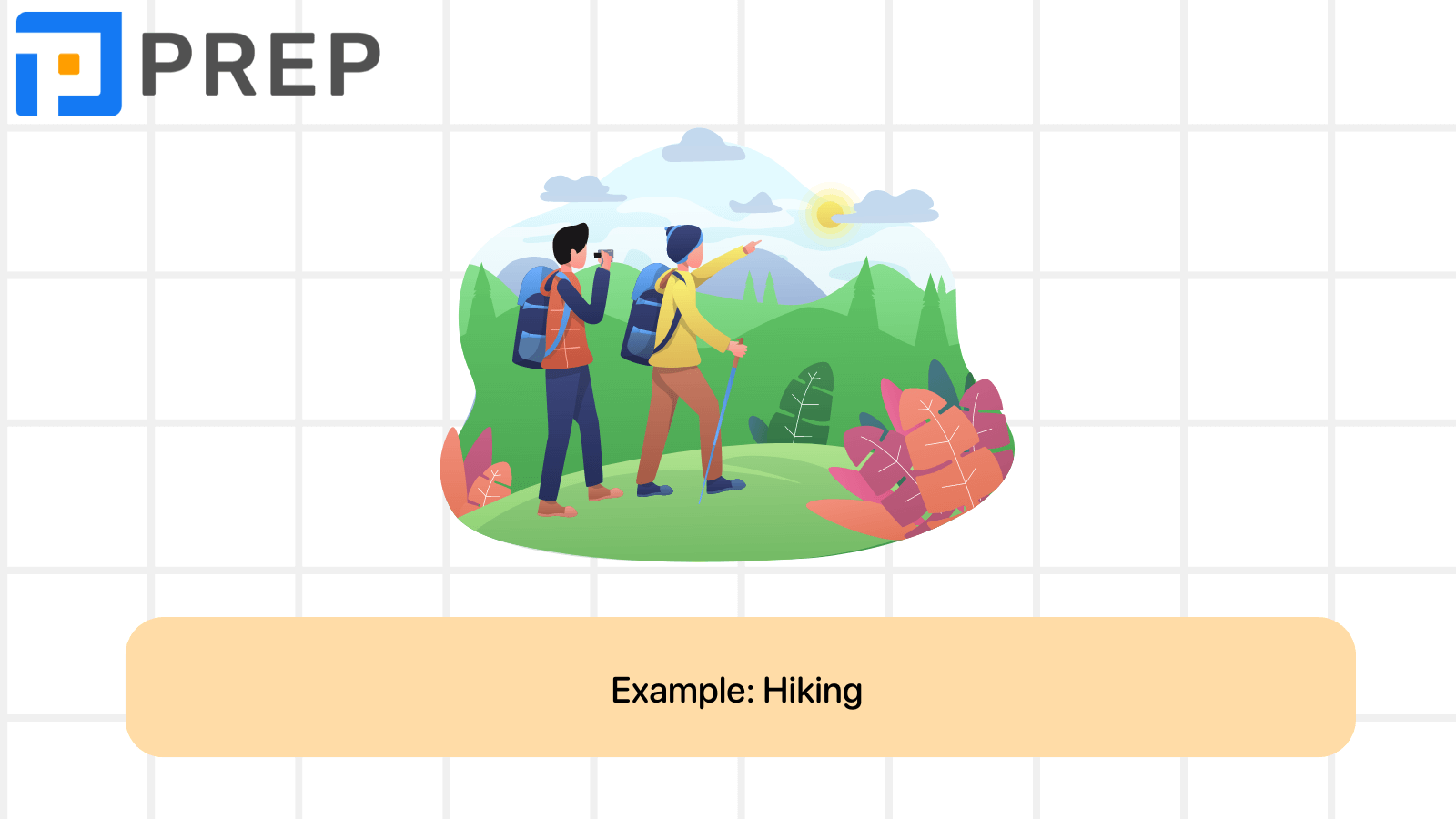
|
B1 vocabulary: Travel and Transportation |
|||
|
Baggage (n): bags, cases, etc. that contain somebody's clothes and things when they are traveling |
Culture (n): the customs and beliefs, art, way of life and social organization of a particular country or group |
Border (n): the line that divides two countries or areas; the land near this line |
Direction (n): the general position a person or thing moves or points towards |
|
Transportation (n): a system for carrying people or goods from one place to another using vehicles, roads, etc. |
Visa (n): a stamp or mark put in your passport by officials of a foreign country that gives you permission to enter, pass through or leave their country |
Brochure (n): a small magazine or book containing pictures and information about something or advertising something |
Immigration (n): the process of coming to live permanently in a different country from the one you were born in; the number of people who do this |
|
Hiking (n): the activity of going for long walks in the country for pleasure |
Relax (v): to rest while you are doing something that you enjoy, especially after work or effort |
Cabin (n): a small room on a ship in which you live or sleep |
Lorry (n): a large vehicle for carrying heavy loads by road |
|
Ecotourism (n): organized holidays that are designed so that the tourists damage the environment as little as possible, especially when some of the money they pay is used to protect the local environment and animals |
Cultural (adj): connected with the culture of a particular society or group, its customs, beliefs, etc. |
Coach (n): a person who trains a person or team in sport |
Windscreen (n): the window across the front of a vehicle |
|
Leisure travel (n): trips made for entertainment, recreation, relaxation, or personal enrichment |
Safe (adj): protected from any danger, harm or loss |
Confirm (v): to state or show that something is definitely true or correct, especially by providing evidence |
Vehicle (n): a thing that is used for transporting people or goods from one place to another, such as a car or lorry |
|
Short break (n): A short vacation or holiday |
Unforgettable (adj): if something is unforgettable, you cannot forget it, usually because it is so beautiful, interesting, pleasant, etc. |
Currency (n): the system of money that a country uses |
Souvenir (n): a thing that you buy and/or keep to remind yourself of a place, an occasion or a holiday; something that you bring back for other people when you have been on holiday |
|
Tourist trap (n): a place that attracts a lot of tourists and where food, drink, entertainment, etc. is more expensive than normal |
Convenient (Adj): useful, easy or quick to do; not causing problems |
Custom (n): an accepted way of behaving or of doing things in a society or a community |
Delay (v): a period of time when somebody/something has to wait because of a problem that makes something slow or late |
|
Destination (n): a place to which somebody/something is going or being sent |
Abroad (n): in or to a foreign country |
Airline (n): a company that provides regular flights to take passengers and goods to different places |
Depart (v): to leave a place, especially to start a trip |
|
Sightseeing (n): the activity of visiting interesting buildings and places as a tourist |
|
|
|
13. Sports
Sports is the next theme with lots of B1 vocabulary. PREP has compiled a list of words along with their pronunciation, meanings, and examples to deepen your understanding of each word.

|
B1 vocabulary: Sport |
|||
|
Skiing (n): the sport or activity of moving over snow on skis |
Score (v): to win points, goals, etc. in a game or competition |
Agile (adj): able to move quickly and easily |
Challenge (n): a new or difficult task that tests somebody’s ability and skill |
|
Gymnastics (n): physical exercises, often using special equipment, that develop and show the body’s strength and ability to move and bend easily, often done as a sport in competitions |
Entertain (v): to interest somebody or make somebody laugh in order to please them |
Skilled (adj): having enough ability, experience and knowledge to be able to do something well |
Champion (n): a person, team, etc. that has won a competition, especially in a sport |
|
Athletics (n): sports such as running, jumping and throwing that people compete in |
Compete (v): to take part in a contest or game |
Disciplined (n): trained to obey rules and orders and behave in a way that shows control |
Coach (n):a person who trains a person or team in sport |
|
Yoga (n): a Hindu philosophy that teaches you how to control your body and mind in the belief that you can become united with the spirit of the universe in this way |
Run (v): to move using your legs, going faster than when you walk |
Exciting (adj): causing great interest or excitement |
Captain (n): the person in charge of a ship or commercial aircraft |
|
Cycling: (n): the sport or activity of riding a bicycle |
Shoot (v): to fire a gun or other weapon; to fire something from a weapon |
Pass (v): to achieve the required standard in an exam, a test, etc. |
Athletics (n): sports such as running, jumping and throwing that people compete in |
|
Volleyball (n): a game in which two teams of six players use their hands to hit a large ball backwards and forwards over a high net while trying not to let the ball touch the ground on their own side |
Pleasure (n): a state of feeling or being happy or satisfied |
Athlete (n): a person who competes in sports |
Goalkeeper (n): in football (soccer), hockey, etc.) a player whose job is to stop the ball from going into his or her own team’s goal |
|
League (n): a group of sports teams who all play each other to earn points and find which team is best |
Season (n): any of the four main periods of the year: spring, summer, autumn and winter |
Contest (n): a competition in which people try to win something |
Instructor (n): a person whose job is to teach somebody a practical skill or sport |
14. Shopping
Next is the B1 vocabulary of shopping - a familiar topic. Let’s accompany PREP into diving into those words!
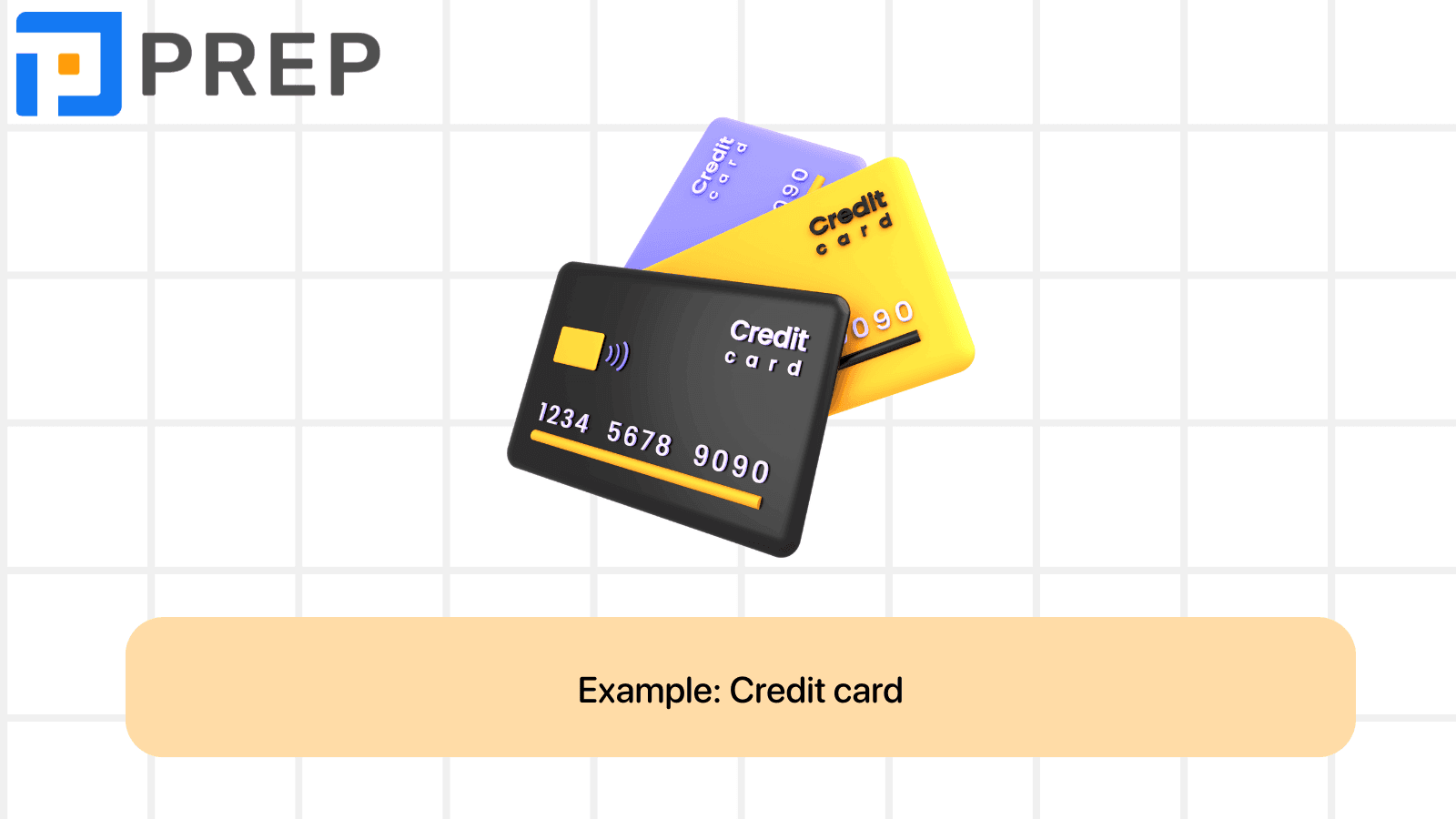
|
B1 vocabulary: Shopping |
|||
|
Advertise (v): to tell the public about a product or a service in order to encourage people to buy or to use it |
Exchange (v): to give something to somebody and at the same time receive the same type of thing from them |
Mall (n): a large building or covered area that has many shops, restaurants, etc. inside it |
Store (n): a large shop that sells many different types of goods |
|
Bargain (v): to discuss prices, conditions, etc. with somebody in order to reach an agreement that is acceptable |
Label (n): a piece of paper, etc. that is attached to something and that gives information about it |
Reasonable (adj): fair, practical, and sensible |
Luxury (n): the fact of enjoying special and expensive things, particularly food and drink, clothes and places |
|
Complain (v): to say that you are annoyed, unhappy or not satisfied about somebody/something |
Logo (n): a printed design or symbol that a company or an organization uses as its special sign |
Reduce (v): to make something less or smaller in size, quantity, price, etc.; to become less or smaller in size, quantity, etc. |
Reserve (v): to ask for a seat, table, room, etc. to be available for you or somebody else at a future time |
|
credit card (n): a small plastic card that you can use to buy goods and services and pay for them later |
|
|
|
15. Work
Let’s check out B1 vocabulary related to work - a familiar topic in daily life with PREP!
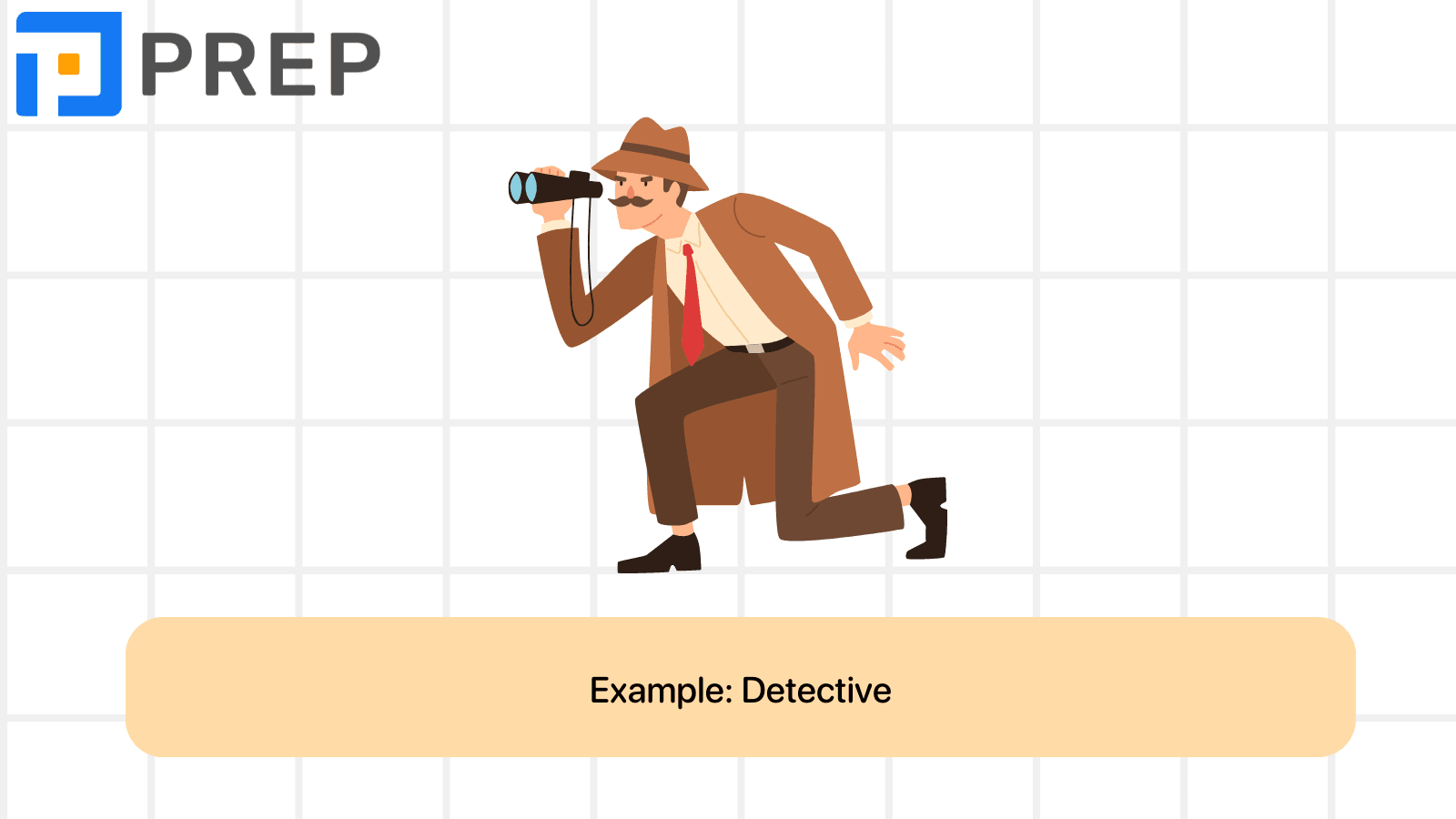
|
B1 vocabulary: Work |
|||
|
Architect (n): a person whose job is designing buildings |
Achieve (v): to succeed in reaching a particular goal, status or standard, especially by making an effort for a long time |
Organise (v): to make all the arrangements for something to happen or be provided |
Career (n): the series of jobs that a person has in a particular area of work, usually involving more responsibility as time passes |
|
Astronaut (n): a person whose job involves traveling and working in a spacecraft |
Canteen (n): a place where food and drink are served in a factory, a school, etc. |
Communicate (v): to share or exchange information, news, ideas, feelings, etc. |
Director (n): one of a group of senior managers who run a company |
|
Assistant (n): a person who helps or supports somebody, usually in their job |
Challenge (n): a new or difficult task that tests somebody’s ability and skill |
Manage (v): to control or be in charge of a business, a team, an organization, land, etc. |
Duty (n): something that you feel you have to do because it is your moral or legal responsibility |
|
Butcher (n): a person whose job is cutting up and selling meat in a shop or killing animals for this purpose |
Detective (n):a person, especially a police officer, whose job is to investigate crimes and catch criminals |
Develop (v): to gradually grow or become bigger, more advanced, stronger, etc.; to make something do this |
Skill (n): the ability to do something well |
|
Candidate (n): a person who is trying to be elected or is applying for a job |
Contract (n): an official written agreement |
Achieve (v): to succeed in reaching a particular goal, status or standard, especially by making an effort for a long time |
Training (n): the process of learning the skills that you need to do a job |
|
Employee (n): a person who is paid to work for somebody |
Reward (v): a thing that you are given because you have done something good, worked hard, etc. |
Challenge (v): a new or difficult task that tests somebody’s ability and skill |
Apply (v):to make a formal request, usually in writing, for something such as a job, a loan, permission for something, a place at a university, etc. |
|
Journalist (n): a person whose job is to collect and write news stories for newspapers, magazines, radio, television or online news sites |
Efficient (adj): doing something in a good, careful and complete way with no waste of time, money or energy |
Efficient (adj): doing something in a good, careful and complete way with no waste of time, money or energy |
Interview (v): to talk to somebody and ask them questions at a formal meeting to find out if they are suitable for a job, course of study, etc. |
|
Hairdresser (n): a person whose job is to cut, wash and shape hair |
Motivated (adj): done or happening for a particular reason |
Explorer (n): a person who travels to places where few people have been before or places that are unknown to them, in order to find out more about them |
Creative (adj): involving the use of skill and the imagination to produce something new or a work of art |
|
Lawyer (n):a person who is trained and qualified to advise people about the law and to represent them in court, and to write legal documents |
Responsible (n): having the job or duty of doing something or taking care of somebody/something, so that you may be blamed if something goes wrong |
Accept (v): to take willingly something that is offered; to say ‘yes’ to an offer, invitation, etc. |
Proactive (adj): controlling a situation by making things happen rather than waiting for things to happen and then reacting to them |
|
Firefighter (n): a person whose job is to put out fires |
Punctual (adj): happening or doing something at the arranged or correct time; not late |
Owner (n): a person who owns something |
Adaptable (adj): able to change or be changed in order to deal successfully with new situations |
|
Model (n): a person whose job is to wear and show new styles of clothes and be photographed wearing them |
Crew (n): all the people working on a ship, plane, etc. |
|
|
See more articles:
II. B1 vocabulary by the alphabet
Studying vocabulary through topics is one of the most effective learning methods shared by experienced teachers. In addition, studying vocabulary according to the alphabet is also one of the widely-applied methods. Below, PREP has researched and compiled B1 vocabulary according to the alphabet from the Cambridge dictionary so that you can download and practice!
III. Exercises on B1 vocabulary with detailed answers
Exercise: Match the B1 vocabulary with the appropriate definition
|
B1 vocabulary |
Definition |
|
Assistant |
the job or series of jobs that you do during your working life, especially if you continue to get better jobs and earn more money |
|
Career |
something that you have to do because it is part of your job, or something that you feel is the right thing to do |
|
Director |
someone who helps someone else to do a job |
|
Duty |
an ability to do an activity or job well, especially because you have practiced it |
|
Skill |
a manager of an organization, company, college, etc… |
Answer keys:
|
B1 vocabulary |
Definition |
|
Assistant |
someone who helps someone else to do a job |
|
Career |
the job or series of jobs that you do during your working life, especially if you continue to get better jobs and earn more money |
|
Director |
a manager of an organisation, company, college, etc… |
|
Duty |
something that you have to do because it is part of your job, or something that you feel is the right thing to do |
|
Skill |
an ability to do an activity or job well, especially because you have practised it |
IV. Start Your IELTS Journey
PREP has compiled a comprehensive list of B1 vocabulary. Hopefully, this vocabulary list will help you answer how many vocabulary words are needed to prepare for the B1 exam. If your goal is to achieve a Band 7 or higher, these IELTS resources are for you
- IELTS training online: Master IELTS With Us!

Hi I'm Chloe, and I am currently serving as an Product Content Administrator at Prep Education. With over five years of experience in independent online IELTS study and exam preparation, I am confident in my ability to support learners in achieving their highest possible scores.
Comment
Premium content
View allPersonalized roadmap
Most read












